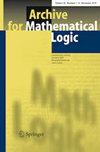Ordered abelian groups that do not have elimination of imaginaries
IF 0.4
4区 数学
Q1 Arts and Humanities
引用次数: 0
Abstract
We investigate the property of elimination of imaginaries for some special cases of ordered abelian groups. We show that certain Hahn products of ordered abelian groups do not eliminate imaginaries in the pure language of ordered groups. Moreover, we prove that, adding finitely many constants to the language of ordered abelian groups, the theories of the finite lexicographic products \(\mathbb {Z}^n\) and \(\mathbb {Z}^n \times \mathbb {Q}\) have definable Skolem functions.
没有消去虚数的有序阿贝尔群
研究了有序阿贝尔群的一些特殊情况下虚消的性质。我们证明了有序阿贝尔群的某些哈恩积在有序群的纯语言中不消除虚。此外,我们证明了在有序阿贝尔群语言中加入有限多常数,有限字典积理论\(\mathbb {Z}^n\)和\(\mathbb {Z}^n \times \mathbb {Q}\)具有可定义的Skolem函数。
本文章由计算机程序翻译,如有差异,请以英文原文为准。
求助全文
约1分钟内获得全文
求助全文
来源期刊

Archive for Mathematical Logic
MATHEMATICS-LOGIC
CiteScore
0.80
自引率
0.00%
发文量
45
审稿时长
6-12 weeks
期刊介绍:
The journal publishes research papers and occasionally surveys or expositions on mathematical logic. Contributions are also welcomed from other related areas, such as theoretical computer science or philosophy, as long as the methods of mathematical logic play a significant role. The journal therefore addresses logicians and mathematicians, computer scientists, and philosophers who are interested in the applications of mathematical logic in their own field, as well as its interactions with other areas of research.
 求助内容:
求助内容: 应助结果提醒方式:
应助结果提醒方式:


